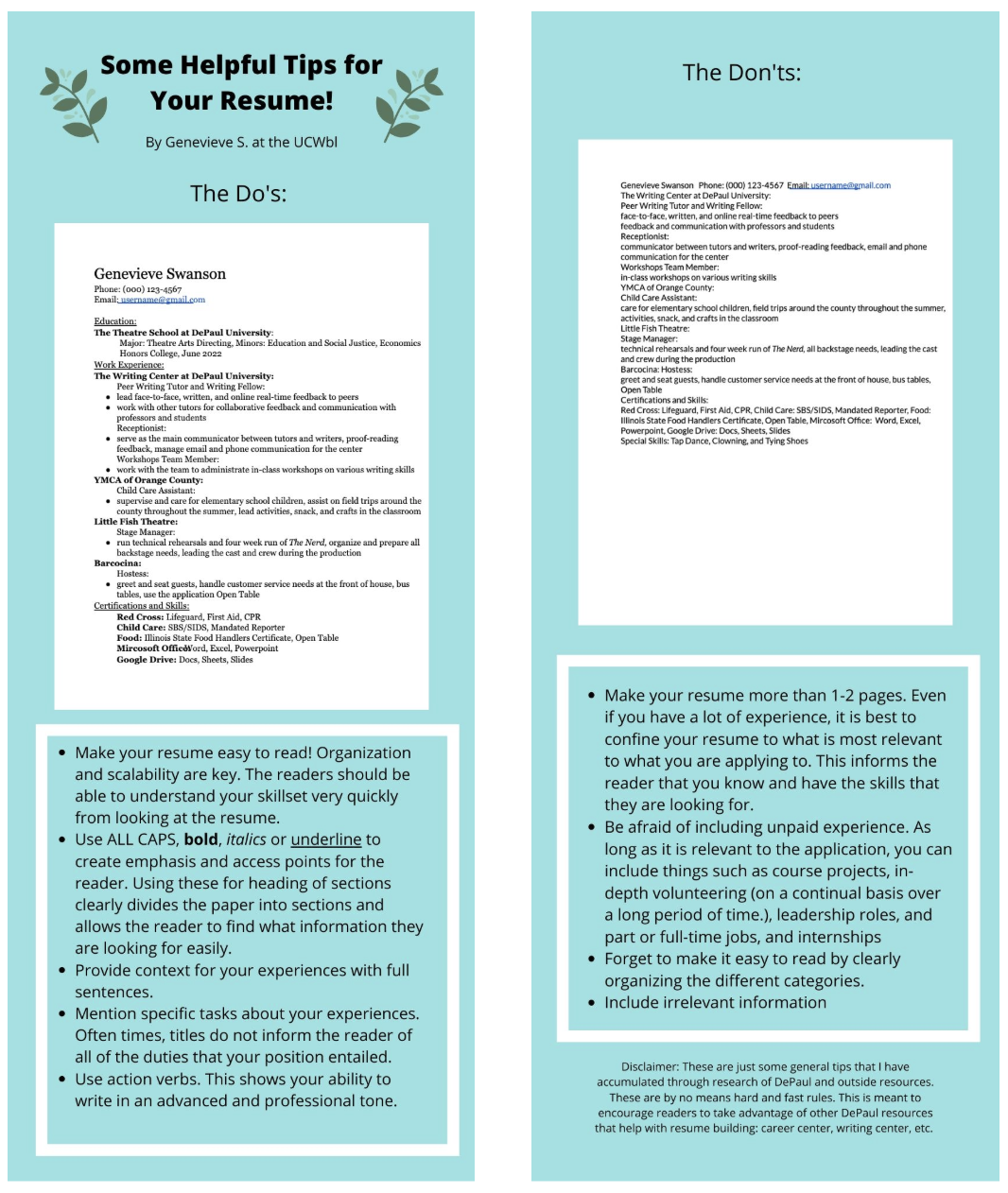When I was brainstorming what I wanted my goals to be for this year would be, I kept coming back to the idea of resumes. Growing up in theatre, I was always revising, adjusting, and frantically rearranging my theatre resume. As I starting moving through high school, I was faced with the challenge of creating a work resume when I wanted to apply to a job. I remember thinking, “A resume for my first job? What do I even put on it?” As it turned out, resumes were a lot more flexible than I had presumed.
My curious sixteen-year-old self, with the help of Google, came up with a hodgepodged page of skills, programs, and volunteer experience which I called a resume. Of course, my resume has evolved a lot since then, but I was never officially taught what to do and what not to do. Over the years, I have taken bits and pieces of information from internet resources, teachers, and theatre resumes in order to get myself this far.
Now that I am in college, I have to create resumes for many different things: directing, acting, internships, child care, restaurants, university programs, etc. I want my resumes to give readers a clear idea of who I am and what I have to offer. Therefore, I decided to research tips on how to make that message clear. I wanted to learn what DePaul’s methods for resume making were and how they compared to my own.
DePaul offers a number of resume guides accessible to anyone on their website. I quickly found that almost every department has its own instruction guide on resumes, as well as the career center and other DePaul resources. Here were my big takeaways from four different DePaul resources:
Career Center:
They outlined four major tips for creating any resume which I found helpful, generalizable, and transferable:
1. Know your Brand
2. Provide Evidence
3. Format for Quick Readers
4. Match Your Resume to the Role
Driehaus College of Business:
They offered a really useful list of misconceptions about resumes. Here are the ones I found the most relevant to my research:
Misconception: Employers only want to see paid work listed on a resume.
Reality: Employers define experience as how you practice the knowledge and skills learned in class.
Misconception: The resume is just a way to show work history.
Reality: The resume is your highlight reel. It’s showcasing your best of the best. This is because recruiters see past behavior as a predictor for future behavior. You select to write what prime examples demonstrate what you are capable of with purpose.
Misconception: Writing complete sentences are usually frowned upon.
Reality: The resume reveals your critical thinking and thought processing abilities.
College of Health and Sciences:
Something I often am confused about is what should go in the description of a position I once held. This guide had a really great explanation of what to include.
Quick tips for quality accomplishment statements:
Emphasize transferable and technical skills and knowledge by way of concrete examples of when you applied them.
Start with a strong action verb, then follow with an explanation of what you did, describe how you did it, and, when possible, include any outcomes that were achieved. Be specific by including quantity, frequency, population, and impact of your work whenever possible. Vary your action verbs throughout the resume.
Accomplishment statements should be in the proper tense (past or present tense) and use correct grammar and punctuation.
College of Computing & Digital Media
This college offered a really great list of transferable skills that can be applied to many different positions. This helps the reader see the relevance of your experience.
Based on my research, I was able to adjust what my idea of a resume was. For the most part, not much of my personal resume making guide was too off, but looking at examples also helped me to compare my own to others. I now feel confident being able to help myself and other DePaul students with their resumes at the writing center.
Hopefully, this post will encourage others to use DePaul’s online resume resources as well! I also made a graphic to sum up my findings! Check out if your college has tips or examples and use them to adjust your own resume. These guides are a great resource in helping you make your first impression as professional as possible.

Sources
“Entry-Level Resume Guide College of Health & Sciences”. Guide. DePaul University Career Center. https://resources.depaul.edu/career-center/resumes-interviews/Documents/CSH%20Entry%20Level%20Resume%20Guide%202013.pdf “College of Computing & Digital Media Entry-Level Resume Guide.” Guide. DePaul University Career Center. https://resources.depaul.edu/career-center/resumes-interviews/Documents/CDM%20Entry%20Level%20Resume%20Guide%202012%20v.2.pdf “Resume Guide Driehaus College of Business”. Guide. DePaul University Career Center. https://resources.depaul.edu/career-center/resumes-interviews/Documents/Business%20Resume%20Packet%208_24_15.pdf “Writing Your Resume”. Guide. DePaul University Career Center. https://resources.depaul.edu/career-center/services-resources/Documents/DePaulCC-1-ResumeBasics.pdf
